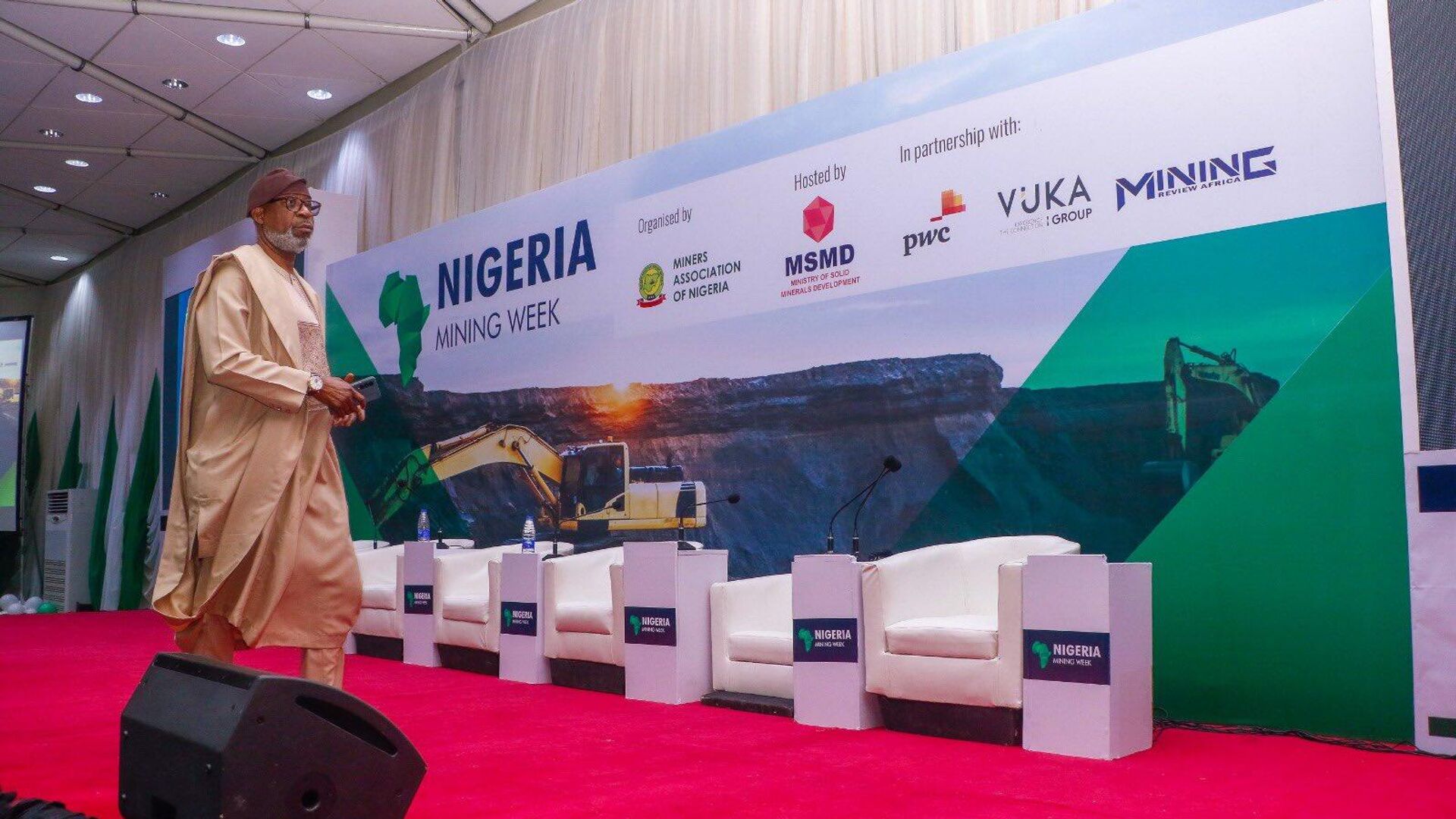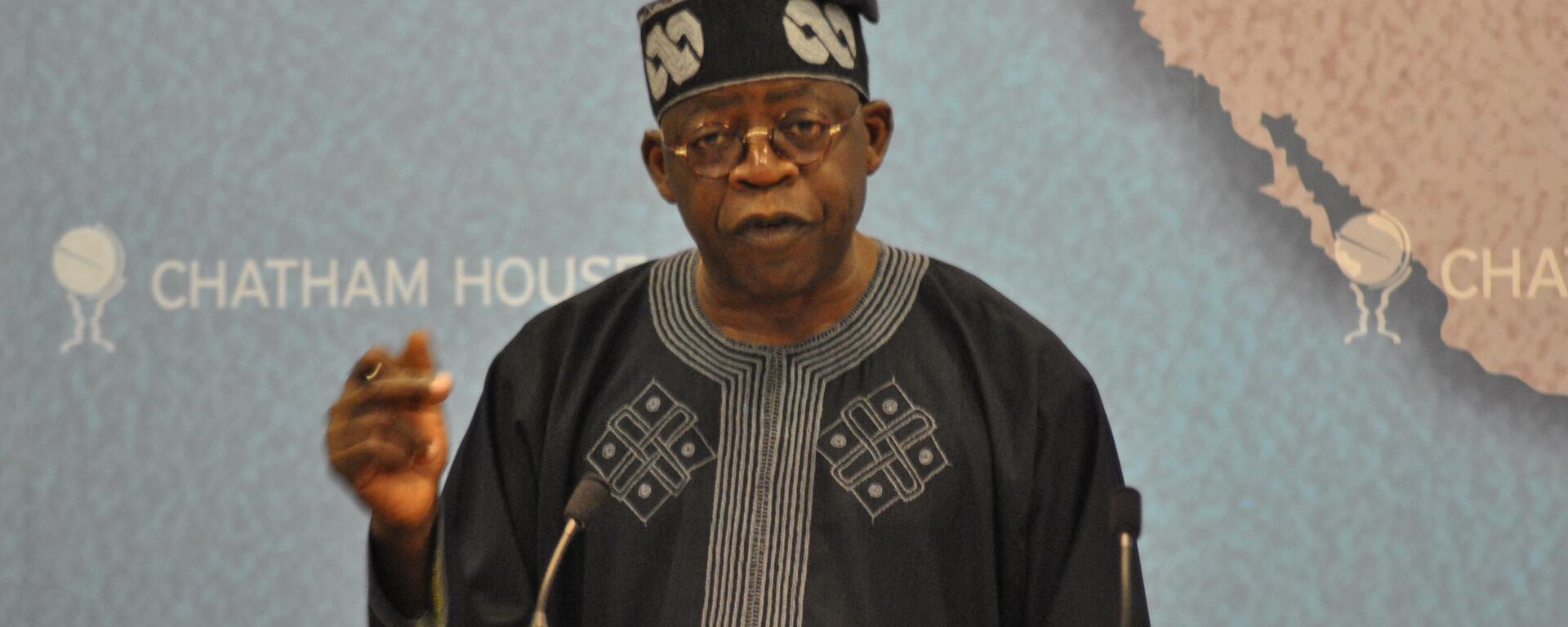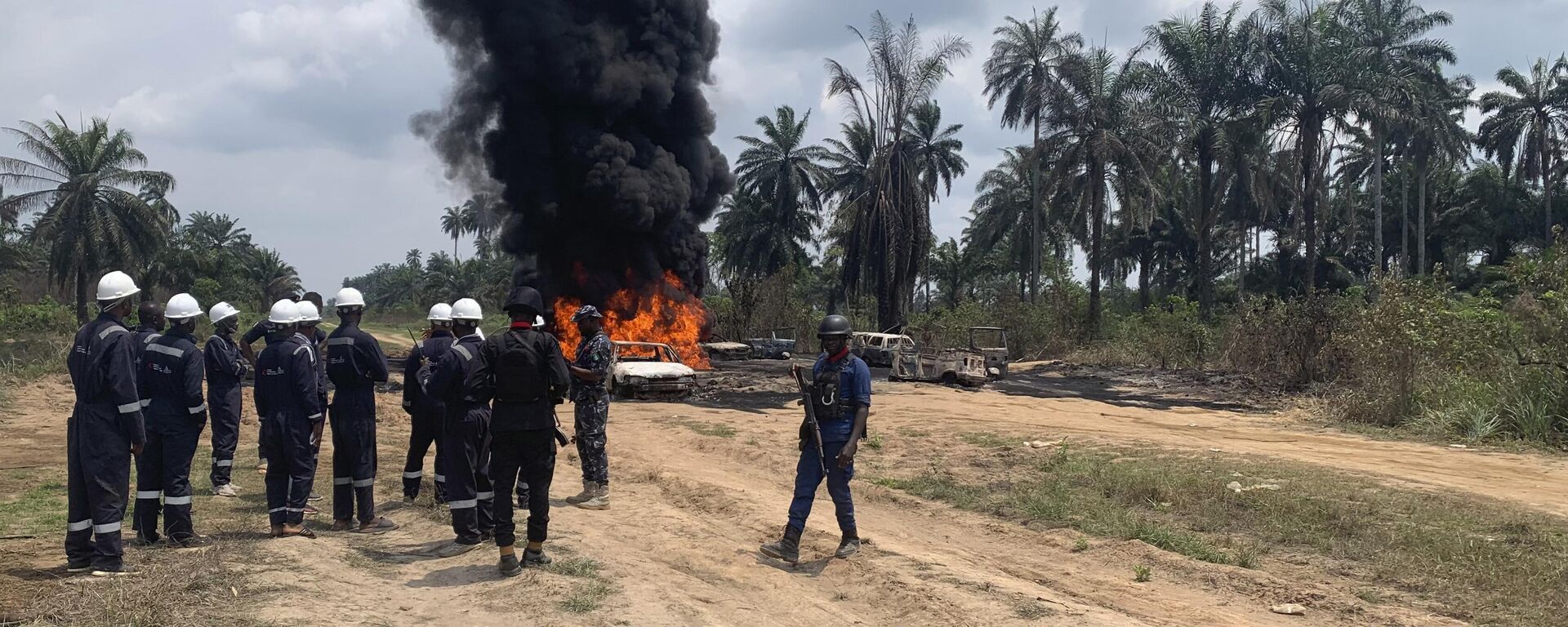https://en.sputniknews.africa/20231024/nigeria-plans-to-tighten-regulations-on-export-of-raw-minerals-minister-1063044347.html
Nigeria Plans to Tighten Regulations on Export of Raw Minerals: Minister
Nigeria Plans to Tighten Regulations on Export of Raw Minerals: Minister
Sputnik Africa
Earlier this month, the West African nation hosted the Nigeria Mining Week, which brought together CEOs of mining companies, miners and senior government... 24.10.2023, Sputnik Africa
2023-10-24T12:37+0200
2023-10-24T12:37+0200
2023-10-24T12:37+0200
sub-saharan africa
west africa
nigeria
bola tinubu
economy
indonesia
minerals
oil
finance
mining
https://cdn1.img.sputniknews.africa/img/07e7/0a/18/1063045481_0:84:1600:984_1920x0_80_0_0_d0453238250b84cbd173c2ba30966acd.jpg
Nigeria is going to introduce stricter regulations to decrease the exportation of raw minerals and promote the shipment of processed goods as part of the government's efforts to generate employment and boost the value of the country's exports, Henry Dele Alake, Minister for Solid Minerals, told media. One of Africa's biggest oil producers is counting on its mineral resources to offer a new income stream amid declining oil production. According to the minister, Nigeria's abundant mineral resources can be used to revive the economy. Therefore, to achieve this goal, the government focuses on enhancing regulation in this field and improving local processing capabilities. He noted that it's necessary for mining companies to not only exploit the nation's resources but also create opportunities to increase the value of exports locally.The current administration under President Bola Tinubu has repeatedly highlighted that it is shifting attention from hydrocarbons towards development of other minerals. The country has deposits of lithium, gold, bitumen, and iron ore. It aims to follow Indonesia's example and enhance its commodity value chain and employment opportunities. After obligating buyers to establish refineries in the country, Indonesia saw its nickel exports increase by ten times in just five years.The minister recalled that Nigeria had recently entered into an agreement with Australian authorities to provide training for locals on the technicalities of the mining industry. This is expected to result in better regulation and more efficient exploration of solid minerals in the country, Alake noted.In his closing remarks at the end of the Nigeria Mining Week in Abuja, Alake stressed that the participants "gathered to shape the future of our mineral resources - a pivotal moment for our nation's growth." He underscored the government's commitment to promoting progress and sustainable growth in the solid minerals' industry, reiterating that "mineral resources play a critical role" in the nation's development.Speaking at the event, President Tinubu, for his part, emphasized the importance of maximizing Nigeria's mining potential while minimizing losses through the export of raw minerals. He noted that the Nigerian government is currently developing a policy document to promote "value addition" to solid minerals before export.Previous administrations have also attempted to revitalize the mining and quarrying sector. Ten years ago, the administration of then-President Goodluck Jonathan established a goal of increasing mining's contribution to gross domestic product to 3% by 2015. However, the sector only accounted for 0.2% of output in 2022.Attracting foreign companies to the country's mining sector is challenging due to unreliable electricity supply and weak domestic demand, with illegal miners extracting most of the minerals. Moreover, in Northern Nigeria, there is a persistent issue of insecurity caused by armed gangs committing mass abductions and killings.Last month, the government announced the implementation of new regulations to combat smuggling and enhance industry oversight. Additionally, it was noted that licenses not utilized within 18 months will be revoked.
https://en.sputniknews.africa/20231019/more-value-addition--employment-nigeria-moves-away-from-exporting-raw-mineral-ores-says-tinubu-1062920682.html
https://en.sputniknews.africa/20231003/at-least-18-people-die-in-illegal-refinery-blaze-in-nigeria-1062522139.html
west africa
nigeria
indonesia
Sputnik Africa
feedback@sputniknews.com
+74956456601
MIA „Rossiya Segodnya“
2023
News
en_EN
Sputnik Africa
feedback@sputniknews.com
+74956456601
MIA „Rossiya Segodnya“
Sputnik Africa
feedback@sputniknews.com
+74956456601
MIA „Rossiya Segodnya“
west africa, nigeria, bola tinubu, economy, indonesia, minerals, oil, finance, mining
west africa, nigeria, bola tinubu, economy, indonesia, minerals, oil, finance, mining
Nigeria Plans to Tighten Regulations on Export of Raw Minerals: Minister
Earlier this month, the West African nation hosted the Nigeria Mining Week, which brought together CEOs of mining companies, miners and senior government officials, in a bid to "shape the future" of the nation's mineral resources.
Nigeria is going to introduce stricter regulations to decrease the exportation of raw minerals and promote the shipment of processed goods as part of the government's efforts to generate employment and boost the value of the country's exports, Henry Dele Alake, Minister for Solid Minerals, told media.
"You can’t take our minerals away without adding value locally," Alake said, adding: "Which means you must start a factory to produce something that is associated with the mineral that you are taking out."
One of Africa's biggest oil producers is counting on its mineral resources to offer a new income stream amid declining oil production. According to the minister, Nigeria's abundant mineral resources can be used to
revive the economy.
Therefore, to achieve this goal, the government focuses on enhancing regulation in this field and improving local processing capabilities. He noted that it's necessary for mining companies to not only exploit the nation's resources but also create opportunities to increase the value of exports locally.
The current administration under President Bola Tinubu has repeatedly highlighted that it is shifting attention from
hydrocarbons towards development of other minerals. The country has deposits of lithium, gold, bitumen, and iron ore. It aims to follow Indonesia's example and enhance its commodity value chain and employment opportunities. After obligating buyers to establish refineries in the country, Indonesia saw its nickel exports increase by ten times in just five years.
The minister recalled that Nigeria had recently entered into an agreement with Australian authorities to provide training for locals on the technicalities of the mining industry. This is expected to result in better regulation and more efficient exploration of solid minerals in the country, Alake noted.
The Solid-Minerals Ministry has received "tremendous interest from foreign direct investors," Finance Minister Wale Edun noted at a conference in Abuja on Monday, adding: "We expect some of that to come to fruition."
In his closing remarks at the end of the Nigeria Mining Week in Abuja, Alake stressed that the participants "gathered to shape the future of our mineral resources - a pivotal moment for our nation's growth." He underscored the government's commitment to promoting progress and sustainable growth in the solid minerals' industry, reiterating that "mineral resources play a critical role" in the nation's development.
Speaking at the event, President Tinubu, for his part,
emphasized the importance of maximizing Nigeria's mining potential while minimizing losses through the export of raw minerals. He noted that the Nigerian government is currently developing a policy document to promote "value addition" to solid minerals before export.
Previous administrations have also attempted to revitalize the mining and quarrying sector. Ten years ago, the administration of then-President Goodluck Jonathan established a goal of increasing mining's contribution to gross domestic product to 3% by 2015. However, the sector only accounted for 0.2% of output in 2022.
Attracting foreign companies to the country's mining sector is challenging due to unreliable electricity supply and weak domestic demand, with
illegal miners extracting most of the minerals. Moreover, in Northern Nigeria, there is a persistent issue of insecurity caused by armed gangs committing mass abductions and killings.
Last month, the government announced the implementation of new regulations to combat smuggling and enhance industry oversight. Additionally, it was noted that licenses not utilized within 18 months will be revoked.



